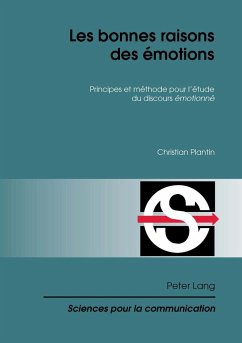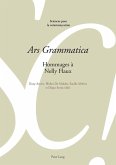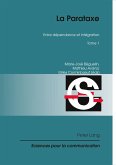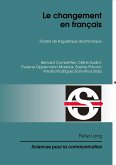Cet ouvrage met en cause la dichotomie régnante " raison contre émotion ", élément fondamental d'un prêt-à-penser qui règne sur les études d'argumentation et qu'on retrouve parfois dans les études du discours. Cette opposition fait obstacle à l'observation et à l'analyse du jeu des émotions parlées et écrites, et engage les études sur l'argumentation ordinaire dans l'impasse d'un langage " an-émotif ", quasi pathologique.
Mettant en jeu des valeurs qui expriment les intérêts et fondent l'identité des locuteurs, les situations argumentatives sont profondément émotionnantes. Ce livre propose une approche holiste, et non psychologique, de l'émotion, vue non pas comme une Réponse passive à une situation Stimulus , mais comme une activité signifiante, formatant le discours et la situation de parole. Sous la notion de construction argumentative des émotions, il défend la thèse de l'inséparabilité des raisons et des émotions dans les discours argumentatifs ordinaires.
Mettant en jeu des valeurs qui expriment les intérêts et fondent l'identité des locuteurs, les situations argumentatives sont profondément émotionnantes. Ce livre propose une approche holiste, et non psychologique, de l'émotion, vue non pas comme une Réponse passive à une situation Stimulus , mais comme une activité signifiante, formatant le discours et la situation de parole. Sous la notion de construction argumentative des émotions, il défend la thèse de l'inséparabilité des raisons et des émotions dans les discours argumentatifs ordinaires.
"It should (...) be noted that the bibliography is extremely rich and the theoretical framework very elaborate. It is a book rich in references, and pleasant to follow in terms of presentation, a real concern for presentation, and clarity. The genuine educational approach (e.g. the use of italics, bold letters and diagrams ) helps the reader to better follow the author's arguments. [...] It should be reiterated that this study is a remarkable contribution to the identification and the description of emotions in discourse." (Vasilica Le Floch, The Linguist List)
"(...) The work is extremely interesting and provides an excellent platform to continue researching the presence and role of emotions in argumentation." (Markku Roinila, Pragmatics & Cognition 20, 2012/1)«It should (...) be noted that the bibliography is extremely rich and the theoretical framework very elaborate. It is a book rich in references, and pleasant to follow in terms of presentation, a real concern for presentation, and clarity. The genuine educational approach (e.g. the use of italics, bold letters and diagrams ) helps the reader to better follow the author's arguments. [...] It should be reiterated that this study is a remarkable contribution to the identification and the description of emotions in discourse.» (Vasilica Le Floch, The Linguist List)
«(...) The work is extremely interesting and provides an excellent platform to continue researching the presence and role of emotions in argumentation.» (Markku Roinila, Pragmatics & Cognition 20, 2012/1)
"(...) The work is extremely interesting and provides an excellent platform to continue researching the presence and role of emotions in argumentation." (Markku Roinila, Pragmatics & Cognition 20, 2012/1)«It should (...) be noted that the bibliography is extremely rich and the theoretical framework very elaborate. It is a book rich in references, and pleasant to follow in terms of presentation, a real concern for presentation, and clarity. The genuine educational approach (e.g. the use of italics, bold letters and diagrams ) helps the reader to better follow the author's arguments. [...] It should be reiterated that this study is a remarkable contribution to the identification and the description of emotions in discourse.» (Vasilica Le Floch, The Linguist List)
«(...) The work is extremely interesting and provides an excellent platform to continue researching the presence and role of emotions in argumentation.» (Markku Roinila, Pragmatics & Cognition 20, 2012/1)








